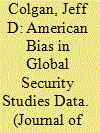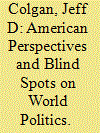|
|
|
Sort Order |
|
|
|
Items / Page
|
|
|
|
|
|
|
| Srl | Item |
| 1 |
ID:
167667


|
|
|
|
|
| Summary/Abstract |
Three major datasets contain problematic interpretative judgments, arguably biased toward the United States: the Polity dataset; Reiter and Stam's data on war outcomes; and Singh and Way's data on nuclear proliferation. These examples raise the possibility that important datasets in global security studies, and in political science more generally, are systematically affected by an American bias. Bias means that, non-Americans might code the same observations differently, on average. The issue arises because Americans, on average, seem to have certain predispositions that non-Americans, on average, do not have. Other nationalities have their own predispositions. I also demonstrate that each of the three empirical examples has significant implications for causal inferences, altering certain statistical findings based upon them. For instance, I reexamine Haber and Menaldo's study of the resource curse, showing that alternative data coding casts substantial doubt on their inferences.
|
|
|
|
|
|
|
|
|
|
|
|
|
|
|
|
| 2 |
ID:
167663


|
|
|
|
|
| Summary/Abstract |
Scholars of international relations (IR) from the United States, like any country, view the world with particular perspectives and beliefs that shape their perceptions, judgments, and worldviews. These perspectives have the potential to affect the answers to a host of important questions—in part by shaping the questions that get asked in the first place. All scholars are potentially affected by national bias, but American bias matters more than others. This special issue focuses on two issues: attention and accuracy in IR research. While previous scholarship has raised principally normative or theoretical concerns about American dominance in IR, our work is heavily empirical and engages directly with the field's mainstream neopositivist approach. The collected articles provide specific, fine-grained examples of how American perspectives matter for IR, using evidence from survey experiments, quantitative datasets, and more. Our evidence suggests that American perspectives, left unexamined, negatively affect our field's research. Still, the essays in this special issue remain bullish about the field's neopositivist project overall. We also offer concrete steps for taking on the problems we identify, and improving our field's scholarship.
|
|
|
|
|
|
|
|
|
|
|
|
|
|
|
|
|
|
|
|
|